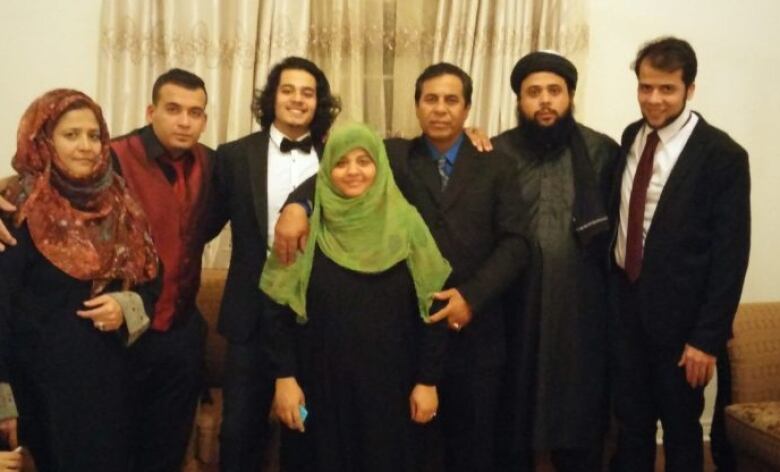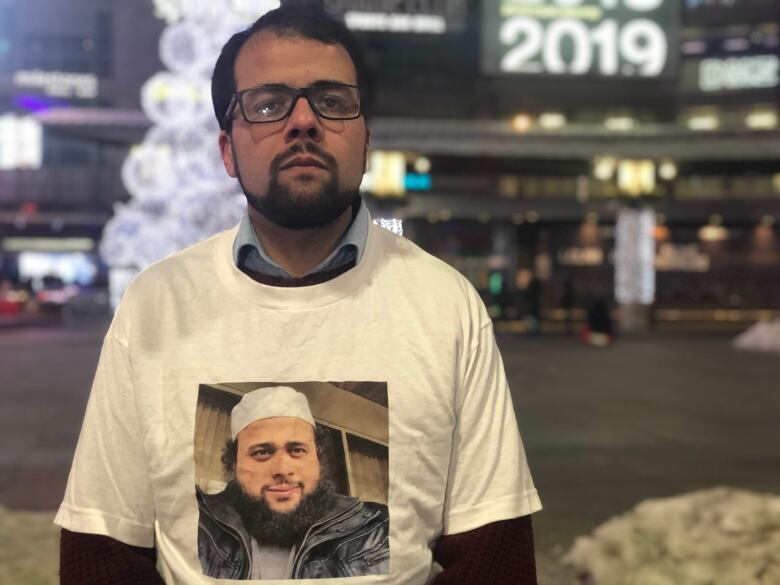Soleiman Faqiri's death should be deemed a homicide, Ontario coroner's counsel says
Union representing jail guards opposes proposal, arguing death 'accidental'

Ontario's coroner's office is calling for Soleiman Faqiri's jail cell death to be deemed a homicide, with its counsel saying the evidence points in "one direction."
"Inquest counsel is proposing homicide as the appropriate manner of death in this case," coroner's counsel Prabhu Rajan told jurors at the inquest into Faqiri's death on Friday.
"In our view Soleiman's death was a tragedy, a preventable tragedy," Rajan said. "We don't take this position lightly, but we believe the evidence points in this one direction."
Speaking to jurors directly, presiding coroner Dr. David Cameron said,"It was no accident that he wasrestrained in the manner that he was."
Jurors at the inquest are tasked with determining the manner of Faqiri's death, choosing from one of five options: natural causes, an accident, homicide, suicide or they could find it undetermined. They may also make recommendations to prevent future deaths.
A verdict is expected early next week.
No one was ever charged criminally in connection with Faqiri's death at the Central East Correctional Centre (CECC) in Lindsay, Ont. on Dec. 15, 2016.
A homicide verdict does not mean automatic criminal charges. Police can choose to reopen their investigation into Faqiri's death, but are not obligated to do so.
What dothe province and union think?
Ontario's Ministry of the Solicitor General did not take a position on Faqiri's manner of death but said it supports some of the recommendations put forward.
Ontario Public Service Employees Union, representing correctional and health-care staff in jails, opposed the proposal of homicide, saying Faqiri's death was not intentional and could not have been foreseen.
OPSEU lawyer Charlie Sinclair argued Faqiri's death should be deemed "accidental."Sinclair reminded jurors that jail staff have testified they didn't have the necessary skill-set or training to care for someone as ill as Faqiri was.
"In our submission, there is no evidence of any intention on anyone's part to kill Mr. Faqiri, nor was it forseeable or expected that death would follow given that they were using ministry-approved techniques," Sinclair said.

The inquest has previously heard guards carried out nearly 60 policy breaches in Faqiri's death.
Ontario's chief forensic pathologist has said the injuries Faqiri sustained in the restraint created "a perfect storm for his death."
The proposed verdict was endorsed by the Canadian Muslim LawyersAssociation andThe Empowerment Council, anadvocacy organization for mental health and addiction service users.
Who was Soleiman Faqiri?
Faqiri was born in Afghanistan in 1986 and was the second of five children. The family came to Canada when he was eight and they settled in Pickering, east of Toronto.
His family has said he was astraight-A student, captain of his high school football team, and that he was especially close to his mother.When he graduated, his future looked bright.In 2005, he enrolled at the University of Waterloo, where he was studying environmental engineering. But his plans were cut short after a car crash when he was 19. Not long after, he was diagnosed with schizophrenia.

From that point on, his life took a turn.He couldn't continue with school and he would go days without sleeping. He started having run-ins with the law, being picked up several times under Ontario's Mental Health Act. When he wasn't consistent with his medications, his condition quickly deteriorated.
At the time of his death, Faqiri, who suffered from schizoaffective disorder a combination of schizophrenic and bipolar symptoms was awaiting a medical evaluation at the Ontario Shores Centre for Mental Health Sciences. He had been charged with aggravated assault, assault, and uttering threats following an altercation with a neighbour, but had not been convicted of any crime.
CBC News first spoke to Faqiri's family just days after his death. His case was subsequently investigated byThe Fifth Estate.
-
'Why did Soleiman die?' Family of mentally ill man who died in Ontario jail says system failed the
-
Deadly Restraint: The Fifth Estate investigates the jail death ofSoleimanFaqiri
How did he die?
Jurors have heard that Faqiri's condition went from bad to worse duringhis time at the jail.
Faqiri died after being repeatedly struck by guards, pepper sprayed twice, covered with a spit hood and left shackled face down on the floor of a segregation cell after being moved from a shower stall, where he allegedly squirted water and shampoo on guards. During the course of his transfer, one guard alleged Faqiri spat at him and slapped Faqiri twice in the face before other guards joined in restraining him.
WATCH|Video shows final moments before Faqiri's deadly restraint:
His cause of death, previously deemed unascertained, was later deemed to be: "Prone position restraint and musculocutaneous injuries sustained during struggle, exertion and pepper spray exposure in a person with an enlarged heart and worsening schizophrenia."
In other words, while none of his injuries on their own were fatal, his death was the result of being held face down on his stomach and the injuries he suffered while being restrained and repeatedly struck.
Why wasn't he sent to a hospital?
By all accounts, Faqiri should not have been in jail but rather at a medical facility, jurors have heard.
"I'd like to say there should have been alarm bells going off when Soleiman entered CECC's doors, but we now know and you have heard that well-intentioned people effectively shouted from a rooftop that Soleiman need help," Rajan told jurors.
Those people included a guard who broke protocol to film Faqiri's declining state in the days before his death in the hope of getting him help, a nurse who pursued a Form 1 application to send Faqiri to the hospital for a mental health assessment, and a manager who alerted some 60 supervising staff that Faqiriwas languishing in his cell covered in feces for four straight days.
WATCH | Corrections officer coaxes Soleiman Faqiri from cell:
The court itself ordered Faqiri be assessed for his fitness to stand trial. Faqiri never had that assessment "essentially because he was in the midst of a psychiatric emergency," Rajan told jurors at the outset of the inquest. "Let the irony of that sit with you for just a moment."
On top of that, Faqiri's own family attempted to visit him multiple times in jail, but were denied. They alerted jail staff about the need for him to be medicated and brought him a Qur'an from home to help comfort him but theywere never allowed to see him for the 11 daysuntil his death because he was deemed too unwell to be brought to a visitation area.
At no point was Faqiri seen by a psychiatrist or sent to a hospital for treatment.
As for why, several witnesses have described a fractured relationshipwith the nearby Ross Memorial Hospital,where inmates in crisis were sometimes taken to the emergency room, only to be quickly sent back, after receiving an antipsychotic injection, due to a lack of mental health beds.
Jurors also heard that neither jail staff or health care staff understood that they could send Faqiri to the hospital, despite policy to do so if a person cannot get the care they need inside. The jail's head of health care testified thatshe didn't believe Faqiri was in enoughphysical danger to warrant being sent that his mental health crisis didn't pose the kinds of obvious physical concerns to meet the threshold.
Faqiri was referred to the jail's psychiatrist, but the inquest has heard that psychiatrist was on vacation at the time.
Why was no one charged?
There were three successive police investigations into Faqiri's death, one by Kawartha Lakes Police Service, another by the Ontario Provincial Police, and then a reinvestigation by the OPP. In their last investigation, the OPP said there was "insufficient evidence" for charges to be laid.
At the time, lawyers for the family said the OPP told them it was impossible to know which of the six or more guards involved delivered the fatal blow.
As previously reported, two managers were fired in the wake of Faqiri's death. Another 13 correctional staff were suspended, but it's unclear how long those suspensions lasted and whether they were paid or unpaid. Ontario's Ministry of the Solicitor General has previously refused to comment, saying human resource matters are confidential.
How is the family feeling?
The family has said it's trusting the inquest process and allowing theevidenceto speak for itself.
They did deliver a statement earlier, which was read aloud to jurors, giving them a chance to hear not only about how Faqiridied but how he lived and what his loss has meant for the family.
It says, in part: "For the last seven years, my family and I have had a deep, painful hole right in the centre of our lives. Soleiman was an anchor for us that was taken away and left us adrift ... His death has left us empty."

The statement ended by calling for the truth to come to light and for the jury to come up with recommendations to prevent deaths like Faqiri'sfrom happening again.
Next week marks seven years since Faqiri's death. Friends and supporters will gather, as they have every year, at a vigil in his memory.
What's being recommended?
The coroner's office is proposing 56 recommendations for jurors to consider with the goal of preventing future deaths like Faqiri's all addressed to the province.
Chief among them is to acknowledge that correctional facilities are not an appropriate environment for people in custody with significant mental health issues.
The recommendations also call for "immediate steps" so that anyone in crisis behind bars is admitted to hospital for assessment, and that those in custody receive an equal level of care to what they would receive in the community.
Jurors heard this "principle of equivalence" is something enshrined in the UN's Mandela Rules. Currently health care is administered to those in custody, not by the provincial health ministry, but rather by the Ministry of the Solicitor General, jurors heard.
They also call for the province to strike a committee immediately to ensure recommendations from Faqiri's inquest are considered and any responses fully reported.
"I simply do not want to do any more of these cases," Rajan told jurors.














_(720p).jpg)


 OFFICIAL HD MUSIC VIDEO.jpg)
.jpg)



























































































